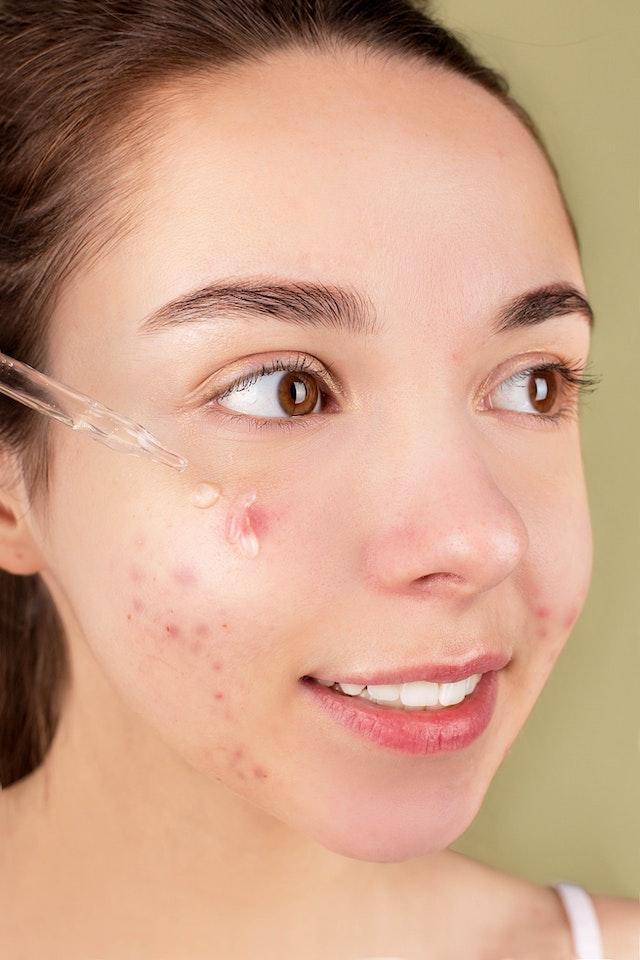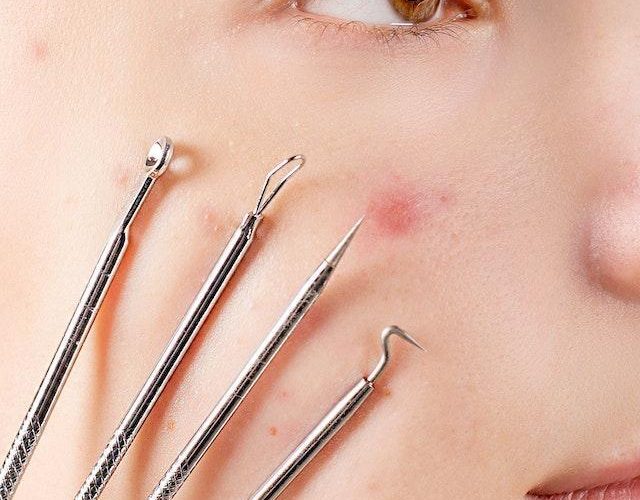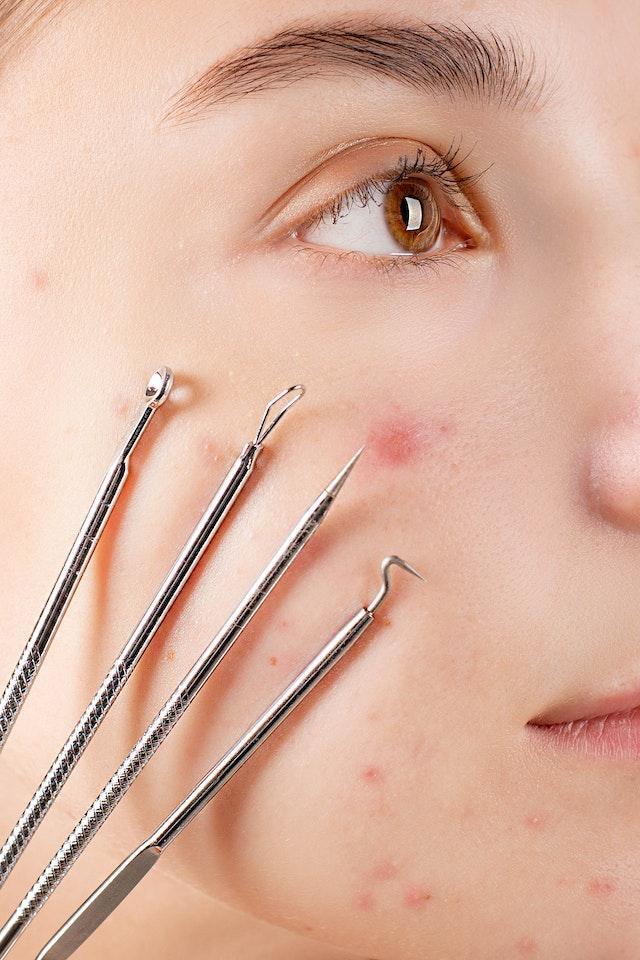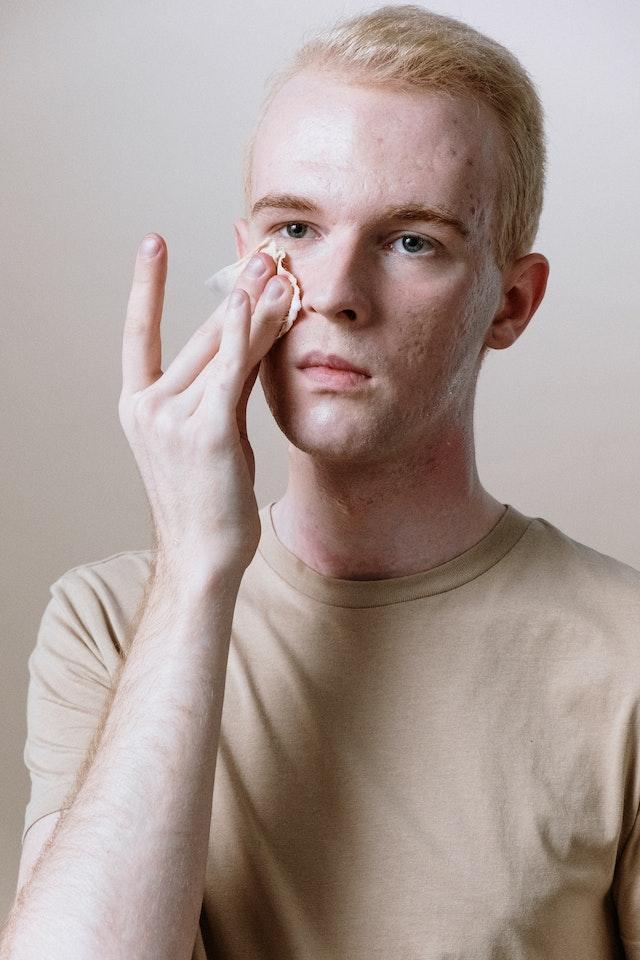Acne is a general skin disease that affects teens and adults. The skin effect can be a big red zit on your nose or a sprinkle of whiteheads on your cheeks. In fact, the struggle from these skin diseases, such as whiteheads, blackheads, pimples, and cystic acne, can last through to menopause. But using the right acne product and skincare routine can zero the effect resulting in clearer skin.
Anyone suffering from skin issues knows the frustration of fighting with annoying red bumps, scares, painful cysts, and sensitivity. The result always dampens self-esteem regardless of how little the effect is. There are many approaches to deal with acne, but the result is only sometimes what you expect. So, this article has cut through the bush to provide five skincare routine tips to prevent and treat acne, making it possible to have clear skin.

Photo by Anna Nekrashevich: https://www.pexels.com/photo/woman-applying-facial-serum-6476077/
What Exactly are Acne and Its Causes?
The skin has millions of sebaceous glands connected by hair follicles secreting sebum (skin oil) to prevent damage to the skin. However, the oil may find it difficult to leave the follicles resulting from several factors, such as hormones.
As a result, hormones are the primary cause of acne by triggering excess sebum production, which gets blocked by dead skin cells causing clogging in the skin pores and acne. On the other hand, teenage acne is caused by puberty. The hormones such as pregnancy, menstrual cycle, and birth control pills can increase oil production, leading to pimples.
Also, stress can cause acne by producing excess cortisol, stimulating oil production, and leading to an outbreak. Here are some tested tips to prevent acne spread out:
1. Wear SPF
After acne disappears, some marks and scars remain on the spot for weeks or months and, if not properly treated, can result in permanent marks. However, those tiny annoying scars can worsen under UV exposure from the sun. As a result, the scars can cause premature aging and skin cancer. So, to be safe, ensure you slather your face with sunscreen like Biologique Recherche Masque Vivant.
However, every formula you use should contain SPF 30 or more from a dermatologist. Stay away from broad-spectrum protection from UVA rays which cause damage, and UVB rays which cause cancer.
2. Cleanser
The first step in the skincare routine is cleansing. The procedure involves a thorough, gently clean with a gel-textured cleanser with your fingertips or soft cloth. During the procedure, wash your jawline, neck, and front and behind the ears. Avoid using rough pads or aggressive scrubbing; the result will be the same.
However, the procedure can be effective if you use the right cleanser on your skin. Although the right cleanser to use depends on the recommendation for the acne medication. For example, OTC wash is an over-the-counter acne medication wash like salicylic acid or benzoyl peroxide, which is suitable for mild breakouts. Also, non-medicated cleansers like Unscented Dove, Neutrogena bar, and Cetaphil are gentle cleansers for flawless skin.
However, people who enjoy wearing makeup and those with sweaty skin must double wash at night for a better result. The procedure is simple; clean, rinse and repeat to ensure makeup traces, sweat, and dirt are cleaned.
3. Follow with a Toner
Toners help to remove excess oil, markup, and cleanser from the skin. However, avoid toners or astringents that cause dryness or irritation to your skin. Also, some acne medications like isotretinoin and topical retinoids are drying agents which do not require a toner. These ingredients help by;
- Removing excess oil
- Toning
- Hydrating
- Preventing blackheads and blemishes
Application Method
Use a cotton ball or pad to gently apply and smoothen the toner on your face and neck. The action will eliminate dirt, markup, and cleanser residues. However, in the case of astringents – drying agents, do the following:
- Oily skin types: People with oily skin types get better results with astringents. However, those with dry skin should use a hydrating toner.
- Alcohol-free products: the alcohol content of a product determines the level of dryness and irritation it causes, especially for sensitive skin types. These products are best for dry or irritating skin caused by acne treatment. Remember that alcohol toners cause more damage by opening pimples on the skin.
Photo by Anna Nekrashevich: https://www.pexels.com/photo/woman-s-face-with-four-skin-extractor-tools-6476083/
4. Apply Moisturizer
It may not seem proper to moisturize oily skin, but it is vital to get rid of acne. However, acne medication causes skin dryness leaving it less moist. But using moisturizer will mitigate dryness and peeling.
Use the moisturizer twice daily but not in a way that leaves the skin slick and greasy. The market is filled with different types of moisturizers that will absorb skin oil without aggravating acne. If you need something lighter, go for lotions and gels instead of creams.
In summary, select a skincare product that is oil and comedogenic-free. These types do not clog skin pores.
5. Target
The last step is to ensure the spot treatment is applied to targeted areas. There are target spot treatment products that are highly concentrated to fight acne. These products contain salicylic acid, tea tree, zinc, and niacinamide, effectively removing blemishes.
Ultimately, use an invisible gel that absorbs quickly and sits under makeup, or use spot stickers during the daytime. These products remove impurities, prevent bacteria, and hide unwanted redness.
https://www.pexels.com/photo/man-in-beige-crew-neck-shirt-covering-his-face-4812647/
Conclusion
While this may sound like a buzzkill, the truth is that these products do not change or heal your acne overnight. The skincare routine must be repeated and may take more than 12 weeks to get visible results. You must use them consistently and ensure you stick to them. Consistent use of this skincare routine and a dermatologist visit is necessary to prevent and treat acne.
























